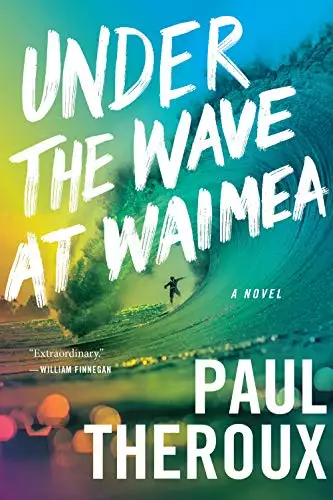And she looked for more. Sometimes—the way the earliest humans studied a stranger—she examined his body to read his history and know him better. He slept naked, and often in their first month together she woke beside him and searched for meaning in the ink on his skin. Much of the imagery was obvious, some of it obscure, a great deal was a record of risk; his disfigurements were those of a warrior, battle scars and scabbed wounds and the sutures from wipeouts and jellyfish stings and face-plants.
In the early hours of muted sallow daylight his tattoos were mottled like bruises, but after sunup they were sharpened, as he lay, facing away from her, his back exposed, a great blue wave covering it like a dragon’s mouth, fanglike foam on its jagged crest tipping past the top of his spine, the well-known print of the Japanese wave at Kanagawa that most people recognized, except that in this depiction Sharkey was surfing the great curved face of it. In his tattoo he was crouched on his long board, one arm extended, as he had surfed a forty-five-footer at Waimea or the great wave at Cortes Bank. But Cortes was so far offshore — a submerged island more than a hundred miles in the ocean west of San Diego — only the boatman had seen him, and few people knew that it was one of his triumphs.
Tribal slashes of black, licks and ribbons, covered his upper arms and deltoids, and the syllable Om in complex Tibetan brushstrokes on each declivity of his shoulders. His arms—“full sleeves”—were enclosed by bands of sharks’ teeth, stylized, triangular. A snake circled his left wrist like a bracelet, an ouroboros, its tail in its mouth. On his right arm more sharks’ teeth, a frigate bird on the back of his hand — his power animal, he called it — flattened, his wings outspread, also serving as the image of a compass. Some were faded, some were fresh, all had meaning.
Hawaiian dots, many of them like pinpricks, a constellation of them on his fingers, and balancing that pattern the Southern Cross on his right foot, below an anklet of dolphins. Tattoos hammered into his skin, rat-tatted with blunt inky spikes in Tahiti and Samoa and poked into him with a chattering needle in Santa Cruz and Recife and Cape Town; Devanagari script from India, a lozenge that looked Egyptian, single words, like the name on the meat of his thumb — an old girlfriend? Olive had finally asked him, but no. “My mother,” and he seemed lovable saying that.
“Your mum,” she said. She cocked her head at him and kissed him. “Your muvva.”
Perhaps, she thought, the whole of his life was inked across his body, that she’d know him better by studying his skin. He was hearty, and twenty-four years older, but the lover she’d longed for, passionate but secure and successful enough not to intrude in her privacy. She wanted to be loved, but not possessed. Sharkey was too self-absorbed and fanatical about surfing to be possessive.
